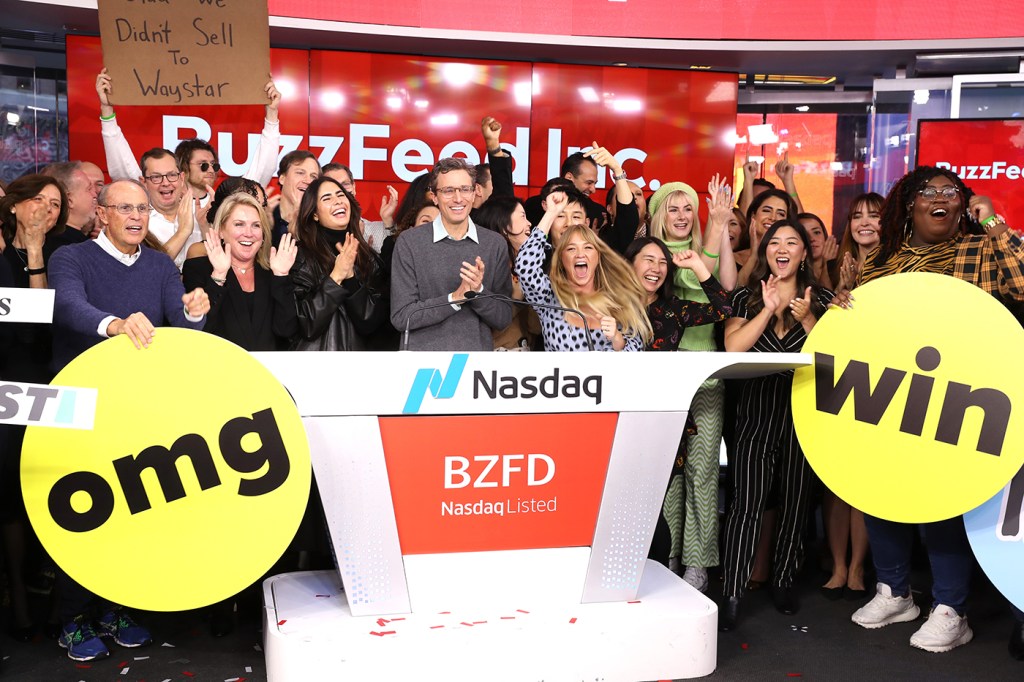BuzzFeed went public. It’s about time.

BuzzFeed, a 15-year-old company, went public in December. Vox Media, another digital outlet, is considering a similar leap.
It’s about time, says John Wihbey, an associate professor who heads Northeastern’s graduate programs in journalism and media innovation. Digital media companies have been competing from a defensive stance that has held them back from pursuing new sources of revenue, he says.
“It’s been a really sad story for the news industry” that previous digital startups haven’t gone public, says Wihbey, author of “The Social Fact: News and Knowledge in a Networked World”. ”I had expected that there would be more media firms ultimately being able to do this sort of thing.”

John Wihbey (left), associate professor of journalism who heads Northeastern’s graduate programs in journalism and media innovation; and Yakov Bart, associate professor of marketing and Joseph G. Riesman Research Professor.Photos by Matthew Modoono/Northeastern University
Budget shortfalls and staffing cutbacks have forced digital media companies to dwell on short-term emergencies. BuzzFeed’s move signals a new commitment to long-term growth, says Wihbey.
“Going public is a vehicle to getting large,” says Yakov Bart, associate professor of marketing and Joseph G. Riesman Research Professor at Northeastern.
Bart says outlets such as BuzzFeed and Vox were wounded when Facebook’s algorithm changed in 2018 to emphasize content shared by users at the expense of digital media companies.
Traditional news companies such as The New York Times, The Economist, and The Wall Street Journal have developed a steady stream of revenue by committing to a paywall. BuzzFeed and Vox haven’t been able to demand subscriptions from users, so they’ve tried another path. BuzzFeed acquired HuffPost in 2020, while Vox last month agreed to buy Group Nine Media—consolidations that have become necessary for digital companies to thrive, says Bart.
“The way for them to make more money is to merge, which would allow them to increase their market power and demand a larger share of advertising revenue on the content from Facebook,” Bart says.
Though BuzzFeed netted a disappointing $16 million when it went public last month by merging with a special purpose acquisition company (SPAC)—far less than the $250 million it could have raised if all of the partners in the SPAC had participated in the merger—Wihbey sees the move into the public market as a breakthrough.
“In the internet era, there’s been this lack of investment in talent and tools—so $16 million can really go a long way to cultivating three or four entrepreneurs within your company who can start new editorial products or figure out new ways of delivering news content,” Wihbey says. “That could be really transformative, but nobody’s had either the inclination or the capital to do it.”
The negative of going public is a loss of independence that may appear in subtle ways, say the Northeastern professors.
“The valuation of competitors is going to get pegged to this public valuation of BuzzFeed,” Bart says. “The question is, what is the fair valuation?”
Adds Wihbey: “I think that they will have less autonomy, potentially; not because there’s necessarily going to be direct influence from a board, but more because the bottom line will become much more important.
“The big downside would be that they have to run really fast and take some risks to meet the expectations of investors,” he says. “But Buzzfeed has already had to contract and pivot its strategy—these are the ups and downs of the media industry.”
Digital media companies may explore additional opportunities from emerging cryptocurrencies and the potential for data-mining regulations that would prevent Facebook and other social media companies from exploiting users’ private information.
“Maybe there’s new room for them in a privacy-protected world where people’s data is harder to come by,” says Wihbey, who praises Jonah Peretti, BuzzFeed’s co-founder and chief executive officer, as a media entrepreneur capable of envisioning new paths.
For media inquiries, please contact media@northeastern.edu.






